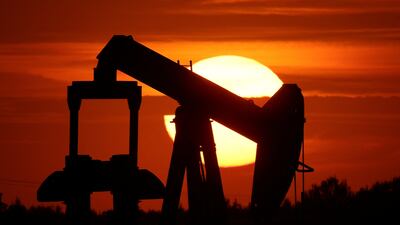Oil prices jumped on Thursday on supply concerns as tension between Russia and Ukraine escalated further after Russian President Vladimir Putin announced a partial military mobilisation and warned Russia would use “all the means available” in its fight against Ukraine.
Brent, the benchmark for two thirds of the world's oil, was trading 2.99 per cent higher at $92.52 a barrel at 5.42pm UAE time. West Texas Intermediate, the gauge that tracks US crude, was up 3.35 per cent at $85.73 a barrel.
Both benchmarks fell on Wednesday after the US Federal Reserve raised its key interest rate for the fifth time this year to slash surging inflation and restore price stability.
"Oil prices are rising again on Thursday after giving up initial gains a day earlier. Nuclear threats are increasingly becoming the norm from the Kremlin, but energy prices remain very sensitive to them," said Craig Erlam, senior market analyst for the UK, Europe, the Middle East and Africa at Oanda. "Still, crude isn't trading too far from the six-month lows and another round of aggressive tightening...won't be helping, as economic fears continue to weigh on demand prospects."
In a televised address to the nation on Wednesday, Mr Putin said the West was aiming to “weaken, divide and ultimately destroy our country” and Russia will “use all the means at our disposal to protect Russia and our people”.
“Russian citizens can be sure that the territorial integrity of our motherland, our freedom and defences shall be secured, I shall stress by all means available to us,” he said.
Oil prices rose following the statement from the Russian president. However, they fell later as the Fed increased the policy rate by 75 basis points, its third consecutive three-quarters of a percentage point increase.
“The tailwinds to prices caused by Russia’s announcement that it will mobilise troops earlier in the day were short-lived,” Norbert Rucker, head of economics and next generation research at Julius Baer, said.
“They were offset later in the day by the headwinds created by the US Federal Reserve’s hiking of interest rates. The bigger picture for the oil market seems to be unchanged. The latest US oil-market statistics largely confirm an incremental easing of market conditions.
“Oil storage continues to swell and is nearing normal levels, helped by stagnant demand, rising production, and releases from strategic storage.”
Oil prices remained volatile this year amid a number of developments including the Russia-Ukraine conflict, Covid-19-related movement restrictions in China, supply disruptions in Libya following the closure of some oilfields, and growing recession fears hitting fuel demand globally. Iran's nuclear talks also affected oil prices.
Brent touched almost $140 per barrel in March as a result of the Ukraine crisis but fell in the subsequent months as central banks from developed nations increased interest rates and concerns grew over global economic growth.
“The upcoming European oil embargo against Russia towards the end of the year suggests more frictions to come. We still believe that the embargo will unlikely bring a major supply loss, but it causes uncertainty, higher shipping costs and more oil stuck in transit,” Mr Rucker, said.
Europe plans to ban most of the Russian oil imports by the end of December to reduce Moscow's oil revenues as it continues its military offensive against Ukraine.
“Oil prices went on a rollercoaster as energy traders watched President Putin escalate the war in Ukraine and as the EIA [Energy Information Administration] report signals some crude demand weakness,” said Edward Moya, a senior market analyst at Oanda.
“The EIA crude oil inventory report was a lot to process, but it didn’t deliver that many surprises. Production remains steady at 12.1 million barrels per day, which is impressive considering oil rig counts have been declining, imports from Canada are roaring back and that should help restore stockpiles.”


